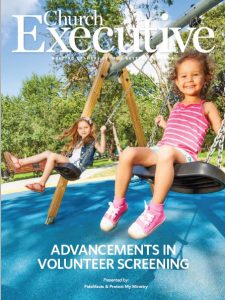
 Proven strategies to keep your people safe — from recognizing red flags to re-screening practices, cost considerations, and navigating potentially sensitive conversations
Proven strategies to keep your people safe — from recognizing red flags to re-screening practices, cost considerations, and navigating potentially sensitive conversations

Owner
Fidelifacts
Many churches fall victim to an “it-can’t-happen-here” mentality. In actuality, what makes churches especially prone to ill-intentioned volunteers?
Norton: The nature and admirable traits of most clergy is one of compassion and trust. Because of this, their tendency is to think the best of people without investigating the background of either potential employees and / or volunteers.
Raley: The grace-centered and trusting nature of churches is well-known to ill-intentioned individuals. Churches are known as soft targets.
Because of this, you need to focus on doing your due diligence to protect your church. Think about most interviews you see post-tragic incident — you’ll almost always hear something along the lines of, “I can’t believe it! I would never have thought that about them; they were so nice.”

Director of Marketing
Protect My Ministry
What does a truly comprehensive volunteer screening process look like in a church?
Raley: Some recommendations for a comprehensive screening process include:
Have a written screening policy. It should be included in any organization’s policies and procedures and communicated to everyone.
Provide job descriptions for every position. Doing so creates boundaries for volunteers, who should be required to read, sign and date the written descriptions.
Obtain a completed application form for all positions. Required information should include name, address, references and employers.
Obtain a signed and dated consent form. This informs volunteers of investigations into their backgrounds and protects an organization against potential invasion-of-privacy claims by having volunteers authorize the checks.
Review references and employer information. This helps determine whether the volunteer possesses the necessities for a given position.
Interview the applicant. Ask interview and/or screening questions online. Develop a standard routine to save time and allow for consistency. Don’t be afraid to ask tough questions.
Conduct a criminal background check. We typically recommend that criminal searches be based on address history, in conjunction with an overall search (the national criminal database and sex offender registry, for example). Also, ensure you’re running the correct names and dates of birth.
Review procedures and provide continuous oversight of volunteers. Evaluate screening results and determine what makes a particular volunteer undesirable. Document decisions, and periodically evaluate a volunteer’s performance.
Provide training for all volunteers. Ensure volunteers complete the necessary training. For positions that involve interaction with youth they should receive Child Safety Training.
Norton: As with all screening, it’s important to know that the company you select to screen volunteers provides a realistic and truthful estimate of the cost involved when checking the past history and behavior of volunteers. It’s essential to have a thorough criminal background check, driver license check, as well as to interview prior employers — and even neighbors, when appropriate.

How about re-screening — are there guidelines you’d recommend?
Norton: The guidelines we’d recommend are not to leave anything to chance. Volunteers are a reflection of the decisions made by the institution, and a bad decision can diminish the good done by the organization and result in substantial monetary loss.
Raley: Just because someone passes a background check doesn’t guarantee that they’ll keep a clean record forever. An initial background screening depicts a moment in time that already happened. The solution to this is through regular re-screenings. There’s always a risk that a current volunteer or staff member could engage in behavior that didn’t appear on your initial background check of them.
Do your recommendations for screening volunteers differ from your recommendations for screening church employees?
Raley: Some churches run different background checks for volunteers versus staff. Some also run different levels of checks based on the extent of involvement a person will have with children. However, we recommend always running the right level of screening, regardless. When you consider the costs of that method failing, it’s just not worth it.
Norton: Screening volunteers is no different than screening job applicants. Being responsible for those you’re charged to protect, and the financial integrity you’re required to maintain, requires having as much information available to make an informed decision.
In churches, two volunteer-related risks loom particularly large: sexual abuse and theft / embezzlement. What background check “red flags” should church leaders be aware of related to these areas of risk?
Raley: Related to those two risks, you’d want to look at instances where charges were pleaded down to a lesser crime. For example, a felony that’s pleaded down to a misdemeanor can still indicate the person’s inclination or character.
Norton: Real-life “red flags” can be a reduction in cash donations; a person always wanting to be the one in charge of cash; someone taking too much of an interest in a minor and meeting off-premises; someone abruptly stopping to attend services or to be alone with an individual; or an unexplained change in attitude and / or demeanor. Sometimes, it’s just a feeling that something is wrong.
Are there other background check “red flags” you’d tell churches to look out for, as well?
Raley: Other “red flags” to look for would be charges or convictions of neglect or abuse of a child, elder, domestic — such as assault charges — as well as drug-related charges, or DUIs. When reportable, it’s also good to look at multiple dismissed convictions for the same or similar charges as, again, that can give you an idea of the person’s inclination or character.
How big of a consideration should price / cost be for a church when it comes to volunteer background checks / screening?
Norton: The cost of doing a thorough background investigation is minor compared with the cost of having done an incomplete job that results in a “bad hire.” It’s important to recognize that there are set expenses charged by States or municipalities to access their files.
Some agencies might offer to do background investigation at what might appear to be a low fee — many times in 24 hours — but questions must be asked as to exactly what they’re covering and if there are any additional charges. A good question to ask is, How far back are you checking criminal records?
Raley: The most important thing in consideration of cost is to partner with your provider, so you have a full understanding of what you’re getting with the background checks you’re running. How they run those checks will not only affect the price but can also affect what’s found. Background checks and background check companies aren’t all created equal. Proper education of what you need (and are getting) is vitally important. Working with a provider that understands the unique needs of churches is crucial to this!
Again, when you consider the costs of the search you select failing to provide you the information that’s needed, it’s not worth basing a decision on saving money.
Every church has a faction of critical, long-time volunteers. Is your recommendation to also screen these volunteers?
Raley: Yes. You might know all your long-time volunteers, but visitors to your church don’t. You need to have established, objective standards and practices to help them feel safe.
Having long-time volunteers that you know serves the existing congregation well; but if you want to grow and bring in new people, they won’t take much comfort from you knowing everybody, or you believing that “it-can’t-happen-here.”
Norton: It’s prudent to screen all volunteers. The religious institution, as well as its leaders, could be charged with negligence and malfeasance if they didn’t avail themselves of the tools available to prevent a problem. If they can show that they made a diligent effort to prevent a problem, then they at least know they did their best, and their conscience is clear. And, it can be relied on should there be some type of legal action filed because of a bad hire.
How might a church navigate these sensitive conversations with long-time volunteers?
Norton: If long-time volunteers are excluded from background checks, new volunteers might feel discriminated against. With the prevalence of lawsuits, it becomes important to demonstrate to your members — and to your community — that you take seriously your responsibility to protect them.
Long-time volunteers can be spoken to individually; they should understand your need to leave nothing to chance, with a deep commitment to keep everyone safe.
At a minimum, recommended checks include a Social Security Number trace (provides a list of addresses the person has used in the past — a useful indicator for where criminal records should be checked); driver license records (usually a three- to seven-year record of license violations — DUI, reckless driving etc.); criminal record checks (conducted based on the county or counties where a person has lived in the past); and federal court criminal and bankruptcy checks (usually date back to 1990).
If someone’s name isn’t common, the criminal check is useful; in most cases, it can cover the entire country.
On the other hand, if a name is very common, it’s difficult to conduct a foolproof federal check because identifying information (dates of birth and addresses) are usually redacted.
Keep in mind that most arrests take place in or close to the county in which a person lives or has lived. In some states, it’s possible to run a statewide check as opposed to a county check. In New York, the only check available is a statewide check, which is quite expensive. On the other hand, it dates back to about 1982, so it’s fairly extensive.
In many states that offer a statewide check, only the most serious cases make it into that type of database.
Be aware that background checks require compliance with the Fair Credit Reporting Act (or Acts, depending on the state). Typically, this requires written permission to run a check.
Raley: The conversation needs to be based on the policies and protocols of the church, not the person. You can also discuss the need to provide a level of comfort to visitors as the church seeks to grow and spread the Gospel.


